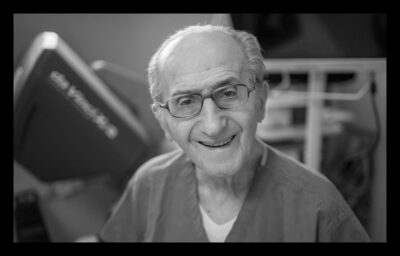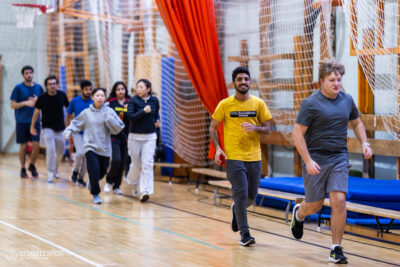 Hundreds of publications, twelve books, 35 patents, and a series of instructional videos show his activity. After his forced emigration, he returned to Hungary several times, helping doctors to learn new protocols. An extremely adventurous career full of ordeals, a fascination with the world of music, persecution by the far right and then the far left, flight from his homeland Hungary, and then a pioneer in the world of modern surgery, creator of new procedures and equipment – this is how the 103 years of Dr. George Berci’s (György Bérci’s) life can be summarized.
Hundreds of publications, twelve books, 35 patents, and a series of instructional videos show his activity. After his forced emigration, he returned to Hungary several times, helping doctors to learn new protocols. An extremely adventurous career full of ordeals, a fascination with the world of music, persecution by the far right and then the far left, flight from his homeland Hungary, and then a pioneer in the world of modern surgery, creator of new procedures and equipment – this is how the 103 years of Dr. George Berci’s (György Bérci’s) life can be summarized.
The surgical training center of Semmelweis University’s Department of Experimental Cardiology and Surgical Techniques in Herceghalom bears his name. He lived to see the plans for the further development of this now internationally renowned institute a month before his death. In the United States, it is customary for universities to name a chair after a famous person, and so the “Chair in Minimally Invasive Surgery in Honor of George Berci” was created in Los Angeles already in his lifetime.
The walls of his study are decorated with certificates of appreciation from universities around the world: In 2011, he received the Jacobson Innovation Award, the highest honor of the American College of Surgeons, an association representing 77,000 members. This award is intended to honor “living surgeons who have been innovators of a new development or technique in any field of surgery.” Previous recipients include Thomas Starzl (liver transplant), J. C. Parodi (endovascular stent grafts), T. J. Fogarty (cardiovascular technique), M. R. Harrison (techniques of fetoscopy for minimally invasive fetal technology), or L. J. Greenfield (vena cava filter). No Hungarian or Hungarian-born surgeon had received such a significant award before.
In 2012, in recognition of his work, our university bestowed upon him the title of Doctor Honoris Causa, and he was also made an honorary member of the Hungarian Surgical Society. On his centennial birthday, he was awarded the Officer’s Cross of the Hungarian Order of Merit by the Hungarian state.
However, Dr. George Berci was not only an eminent surgeon, but also an extremely modest, helpful person with a good sense of humor – he could not walk down the hallway at a congress without saying a few kind words to the participants who had come from all over the world. His first scientific publication came out in 1947, when he was still a medical student. Until his death, even at the age of one hundred and three, he continued to work with impressive vigor at the retirement home in Los Angeles, and his last published study also demonstrated his unparalleled inventiveness: He described the practice of endoscope-assisted decompression of the trigeminal nerve.
What a great, wide-ranging career as a researcher and practicing surgeon who loved his country!
George Berci (György Bérci) remains a role model for us. We will not, we cannot forget him: His work lies behind the way we perform every single laparoscopic surgery. We will miss his personal presence, his wisdom, his quiet humor. In the wake of his life’s work, we can follow his enthusiasm for science and medicine, an enthusiasm that can overcome all political and personal trials – in the spirit of salus aegroti.
May he rest in peace.
In the name of the staff of the Department of Experimental Cardiology and Surgical Techniques at the Városmajor Heart and Vascular Center:
Dr. József Sándor
Translation: Dr. Balázs Csizmadia


